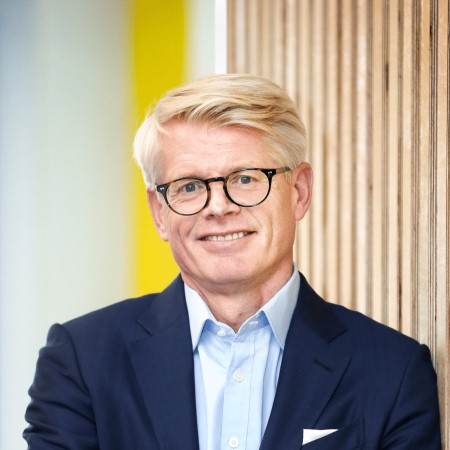Exec Chat: CMR Surgical Prepares For Intensifying Competition In RAS
Executive Summary
In an interview with Medtech Insight, Per Vegard Nerserth, CEO of CMR Surgical, discusses how the company adapted to the pandemic, its future plans, and how the competition for market dominance is shaping up.
For CMR Surgical, 2021 has been an exceptionally busy year, and even busier times for the company are looming.
CMR’s CE-marked Versius surgical robot is now being used in 11 different countries, including Australia and several European countries. Versius also recently was approved by Anvisa, Brazil's equivalent of the US Food and Drug Administration. (Also see "Exec Chat: Rapid Expansion For CMR Surgical As It Launches Robotic System In More Countries" - Medtech Insight, 16 Feb, 2021.)
Also, the company has been deploying $600m that it received in a series D funding round in June of this year. The money will fund further commercialization of Versius, continuing R&D efforts, and establishing a global support network for the robot.
 Per Vegard Nerseth, Ceo, CMR Surgical
Per Vegard Nerseth, Ceo, CMR Surgical
The SoftBank-led round is one of biggest private medtech financings ever and highlights the large appetite investors have for getting a piece of a rapidly expanding market. As immersive technologies integrate closer to the robot and the surgeon controlling it, increasingly complex surgeries are becoming possible. (Also see "Future Of Surgery: Virtual Reality, Robotics And Collaboration" - In Vivo, 7 Sep, 2021.)
CMR has been accelerating the integration of data with Versius. It has been collaborating with Microsoft to develop silica glass materials that can store the vast quantities of data recorded during surgery. This data could then be used to improve robotic surgery. (Also see "CMR Surgical And Microsoft Collaboration Opens Up Questions About Surgical Data Storage" - Medtech Insight, 18 Jun, 2021.)
Medtech Insight spoke again to CMR Surgical’s CEO, Per Vegard Nerseth, to catch up on the company’s developments, and get some perspective of upcoming activities.
The responses to the questions below have been lightly edited for readability.
You’re absolutely right, there are different challenges both from a health care point of view, but then also from a regulatory point of view. We do need a slightly different approach in different countries, and we are in quite a few different countries – in Asia, Europe, the Middle East and also slowly getting into South America.
There’s of course a lot of different topics and different markets to cover that we tackle by employing our own teams in most of those countries. We feel it is important that we are on the ground to understand the challenges so we can treat each of the health care system in a special way to be able to help them in the best way.
Having said that, we have been doing some demos remotely with our demo facility in Cambridge, [England].
The biggest change we’ve seen has been to training and the process of getting a new hospital up and running with Versius. We have really taken up new technologies. Everything from virtual meetings like this [held over Teams, or Zoom] where we have had the surgical team on one side, and the trainers on the other, to virtual reality.
Virtual reality [has allowed CMR to launch in hospitals] where all the training has been delivered by trainers sitting in the UK, to surgeons in their local market. We always have people from CMR in the room [with the surgeons as they learn], but having trainers work remotely has let us train people in places like Hong Kong.
I have to say, if I’d been asked pre-COVID ‘would it be possible to do this?’ I probably would have been more hesitant to say yes. But seeing it in retrospective, it has been working well. Hospitals which have had remote training have operated on their first patients, and these cases have all gone very well.
I have been super proud of our team for being able to get us through the shortages caused by the pandemic. In addition to electronics, we’ve seen a lot of limitations on getting hold of plastics – Versius uses a lot of white plastic around itself.
We have been able, through great work from our supply management team, to get what we need, but it really is almost hand-to-mouth where we are able to just keep up with requirements. We have visibility for some months ahead, but are working all the time to secure the next quarter, and the quarter after that.
My view is that we will probably see supply challenges throughout 2022 – this is a challenge we are going to have to live with.
But what this is about is problem solving. We have gone further by buying components ourselves which we have then handed over to PCB suppliers in order to get necessary components. We buy larger quantities of parts when we can so we have parts for a little longer than we normally would do just to secure production.
I’m not here to talk about our competitors, but they address a very limited number of procedures, so currently we are seeing a stronger and stronger demand for Versius. I’m not too concerned about having a bit more competition – in fact I think it’s just going to drive the market towards growth.
Our focus on Europe is also really helping us to grow. The incumbent players have made a huge amount of their sales in the US and are seeing years of delays and are spending a huge amount of money to get into the European market. Having teams that understand the differences between European countries is a huge strength, and we can capitalize on our smaller size, our nimbleness, to market Versius in different ways to France, Germany, Italy, the EU as a whole, and the UK.
